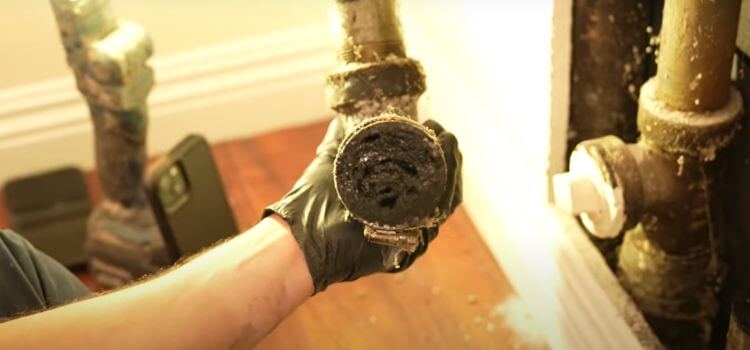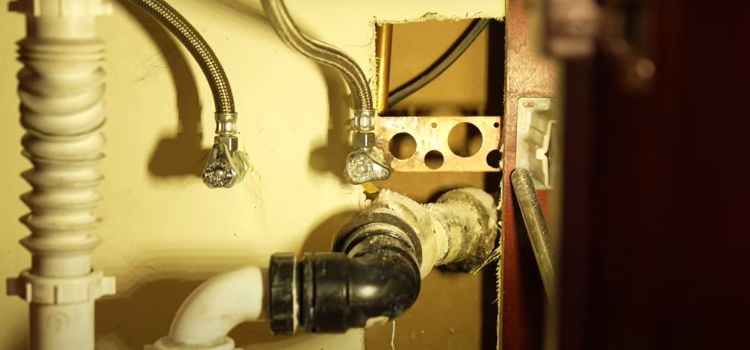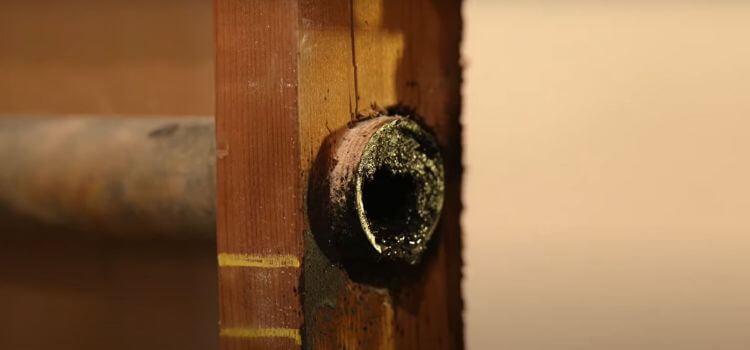Pour boiling water down the drain to loosen grease buildup. Follow with a mixture of baking soda and vinegar.
Grease in drain pipes is a common issue that can lead to clogs and unpleasant odours. Over time, grease solidifies and restricts water flow, causing potential plumbing problems. Addressing this issue promptly ensures the efficient functioning of your drainage system.
Simple household items like boiling water, baking soda, and vinegar can effectively break down and remove grease. Regular maintenance and mindful disposal of grease can prevent future blockages. Understanding these methods can save you from costly plumbing repairs and clear your drains. Keep reading for more detailed steps on how to maintain grease-free drain pipes.

Why It’s Important To Remove Grease From Drain Pipes
Grease buildup in drain pipes can lead to serious plumbing issues. Understanding why removing grease from drain pipes is essential can help prevent costly repairs and ensure a smooth-running household. Grease may seem harmless when it goes down the drain but hardens over time, leading to blockages and pipe damage.
Grease accumulation in pipes can cause various problems. Here are some key reasons why removing grease from drain pipes is crucial:
1. Prevents Blockages
When grease hardens, it can create severe blockages that stop water from flowing freely. This can lead to slow drains and even complete clogs. Regularly removing grease helps keep your pipes clear and prevents these issues.
2. Avoids Expensive Repairs
Blocked pipes can burst due to the pressure buildup. Fixing burst pipes is often expensive and inconvenient. By ensuring your pipes are free from grease, you can avoid costly repairs and potential water damage to your home.
3. Maintains a Healthy Plumbing System
Grease can mix with other debris, making the blockage worse. This can strain your entire plumbing system. Regular maintenance and grease removal keep your plumbing system healthy and functioning efficiently.
4. Reduces Foul Odours
Grease traps food particles and other waste, which can decompose and cause unpleasant odours. Keeping your pipes clean ensures your kitchen and bathrooms smell fresh.
5. Environmentally Friendly
Blocked pipes can lead to sewage backups, contaminating local water sources. Proper grease disposal and regular cleaning are environmentally responsible practices that help protect local ecosystems.
6. Improves Water Flow
Clear pipes allow for better water flow, ensuring sinks and tubs drain quickly. Removing grease buildup ensures optimal water flow throughout your home.
The Type Of Grease In The Drain Pipes
Grease buildup in drain pipes can lead to clogs and unpleasant odours. Identifying the type of grease in your drain pipes is the first step to effectively tackling this issue. Knowing the kind of grease helps you choose the correct cleaning method. Let’s dive into the different types of grease you might encounter.
Types Of Grease
Grease in drain pipes often comes from cooking fats, oils, and soaps. Understanding the source can help remove it.
Animal Fats
Animal fats, which come from meat and dairy products, are solid at room temperature. However, they can harden in pipes, causing severe blockages. Look for solid, whitish residues in your pipes.
Vegetable Oils
Vegetable oils, such as olive and canola cooking oils, are liquid at room temperature but can solidify in more excellent pipes. These oils can mix with other debris, forming sticky clogs. Check for yellowish, sticky substances.
Soap Scum
Soap scum is a mix of soap and hard water minerals. It creates a greasy film inside pipes. This film can trap other debris, worsening clogs. Look for a thin, slimy layer in your pipes.
Identifying Grease With Simple Methods
Use these simple methods to identify the type of grease:
- Visual Inspection: Look for color and texture.
- Touch Test: Feel the residue to determine if it’s solid or sticky.
- Smell Test: Animal fats have a more pungent odour than vegetable oils.
Table: Quick Guide To Identify Grease Types
| Grease Type | Appearance | Source |
|---|---|---|
| Animal Fats | Solid, Whitish | Meats, Dairy |
| Vegetable Oils | Liquid, Yellowish | Cooking Oils |
| Soap Scum | Thin, Slimy | Soap, Hard Water |
Tools And Materials Needed For Removing Grease From Drain Pipes
Grease buildup in drain pipes can cause serious clogs and slow drainage. To tackle this problem effectively, you need the right tools and materials. This section will guide you through the essential items to remove grease from your drain pipes.

Protective Gear
Before starting, wear rubber gloves and safety goggles. These will protect your skin and eyes from harmful chemicals.
Plunger
A plunger is essential for dislodging minor clogs. Choose a plunger with an excellent seal to create enough suction.
Drain Snake
A drain snake or auger is necessary for tougher clogs. This tool can reach deep into the pipes to break up stubborn grease deposits.
Baking Soda And Vinegar
Natural cleaners like baking soda and vinegar can be very effective. They react to create a fizzing action that helps dissolve grease.
Boiling Water
Pouring boiling water down the drain helps melt and wash away grease. However, this method should be used with caution to avoid damaging pipes.
Commercial Drain Cleaner
Commercial drain cleaners are formulated to tackle grease and grime. Follow the instructions carefully to avoid damaging your pipes.
Pipe Brush
A pipe brush can scrub away grease from the sides of the pipes. Choose one that fits the diameter of your pipes for effective cleaning.
Bucket
A bucket helps catch any debris or water that may spill out during cleaning. Keep it handy to avoid any mess.
Wrench
A wrench is essential for loosening pipe connections. It can also be used to access and clean hard-to-reach areas within the plumbing system.
Towels And Rags
Have plenty of towels and rags to wipe up spills and grease. They are also helpful in drying the cleaned areas.
| Tool/Material | Purpose |
|---|---|
| Rubber Gloves & Safety Goggles | Protect skin and eyes |
| Plunger | Dislodge minor clogs |
| Drain Snake | Break up tough clogs |
| Baking Soda & Vinegar | Dissolve grease naturally |
| Boiling Water | Melt grease |
| Commercial Drain Cleaner | Formulated for grease |
| Pipe Brush | Scrub pipe sides |
| Bucket | Catch debris |
| Wrench | Loosen pipe connections |
| Towels & Rags | Wipe spills |
Methods For Removing Grease From Drain Pipes
Grease buildup in drain pipes can cause serious plumbing issues. It can lead to slow drainage, foul odours, and complete blockages. Fortunately, there are several methods to effectively remove grease from drain pipes. Let’s explore some of the most effective strategies.
Boiling Water
Boiling water is one of the simplest methods for removing grease from drain pipes. The heat from the boiling water melts the grease, allowing it to flow more easily through the pipes.
- Boil a large pot of water.
- Carefully pour the boiling water down the drain.
- Repeat this process 2-3 times for stubborn grease buildup.
This method is quick and cost-effective. It’s also safe for most types of plumbing. However, it may not be effective for severe blockages. Always be cautious when handling boiling water to avoid burns.
Baking Soda And Vinegar
Combining baking soda and vinegar is a natural and effective way to clear grease from drain pipes. This method utilizes a chemical reaction to break down the grease.
- Pour half a cup of baking soda down the drain.
- Follow it with half a cup of white vinegar.
- Wait 15-20 minutes while the mixture fizzes and breaks down the grease.
- Flush the drain with boiling water to clear the loosened grease.
This method is eco-friendly and safe for all types of pipes. The fizzing action helps to dislodge the grease and move it out of the pipes. For best results, repeat the process once a month.
Chemical Drain Cleaners
Chemical drain cleaners are commercial products designed to dissolve clogs and grease in drains. These cleaners are highly effective but should be used with caution.
- Read the instructions on the product label carefully.
- Pour the recommended amount of cleaner down the drain.
- Wait for the specified time to allow the chemicals to work.
- Flush the drain with plenty of water.
Chemical drain cleaners can be very powerful and can damage pipes if used improperly. They should not be used frequently or in old, fragile plumbing systems. Always follow safety guidelines and wear gloves and eye protection.
Hydro Jetting
Hydrojetting is a professional method that uses high-pressure water to clean drain pipes. It is especially effective for severe grease blockages.
This method involves a specialized machine that blasts water at very high pressure through the pipes. The force of the water dislodges grease, debris, and other blockages.
Hydrojetting requires professional equipment and should be performed by a licensed plumber. It is effective for both residential and commercial plumbing systems. The high-pressure water can reach areas that other methods cannot.
This method is also environmentally friendly, using only water and no harsh chemicals.
Manual Removal
Manual removal involves physically removing the grease from the drain pipes. This method may be necessary for severe blockages that other methods cannot clear.
- Use a plumbing snake or auger to reach into the pipe and break up the grease.
- A plunger can also be used to create suction and dislodge the grease.
- Remove the trap under the sink for kitchen sinks and clean it manually.
Manual removal can be effective but may require some plumbing knowledge. It can be messy and time-consuming. Always take care to reassemble any plumbing parts securely to prevent leaks.
Sometimes, calling a professional plumber for manual removal may be best to avoid pipe damage.
Preventing Grease Buildup In Drain Pipes
Grease in drain pipes causes blockages and nasty odours. Knowing how to remove grease from drain pipes is crucial, as is preventing grease buildup. Regular maintenance and smart habits keep drains clear and odor-free.
Proper Disposal Of Grease
Never pour grease down the drain. Instead, pour it into a container and let it cool. Once solid, throw it in the trash. This simple habit can significantly reduce grease buildup in your pipes.
Use A Grease Trap
Install a grease trap under your sink. This device captures grease before it enters the drain. Clean the trap regularly to ensure it functions effectively. Grease traps are especially useful in commercial kitchens.
Regular Hot Water Flushing
Run hot water down your drain once a week. Hot water helps dissolve minor grease buildups. For extra effectiveness, follow this by flushing a mixture of hot water and dish soap.
Avoid Greasy Foods In The Disposal
Minimize the use of your garbage disposal for greasy foods. Scrape plates into the trash before rinsing them in the sink. This reduces the amount of grease entering your pipes.
Use Baking Soda And Vinegar
Once a month, pour half a cup of baking soda down the drain. Follow this with half a cup of vinegar. Let it sit for 15 minutes, then flush with hot water. This natural solution helps keep grease at bay.
Install A Drain Screen
Place a drain screen over your sink drain. This simple device catches food particles and debris. Regularly clean the screen to prevent blockages and grease buildup.
Educate Your Household
Teach everyone in your household about proper grease disposal. Make sure everyone knows not to pour grease down the drain. Shared knowledge helps maintain clean and clear pipes.
Use Biodegradable Cleaners
Opt for biodegradable cleaners that break down grease. These eco-friendly products are safe for your pipes and the environment. Regular use keeps your drains grease-free.
Monitor Your Drains
Keep an eye on how quickly water drains from your sink. Slow drainage can indicate grease buildup. Address slow drains promptly to prevent more significant issues.
When To Call A Professional
Grease buildup in drain pipes can cause serious plumbing problems. While some clogs can be handled with DIY methods, there are times when calling a professional is the best option. Knowing when to call a professional can save you time and money and prevent further damage to your plumbing system.
When Diy Methods Fail
DIY methods are great for minor clogs. But if you’ve tried hot water, baking soda, vinegar, or a plunger with no success, it’s time to call a professional. Stubborn grease clogs require specialized tools and expertise only professionals can provide.
Frequent Clogs
If your drain clogs repeatedly, it might indicate a more serious issue. Frequent clogs suggest there’s more grease buildup deep in the pipes. A professional plumber can diagnose the problem and offer a permanent solution.
Slow Draining Water
Slow water draining is a sign of significant grease buildup. If not addressed, this issue can escalate quickly. A professional can use cameras and other equipment to locate and remove the blockage.
Unpleasant Odours
Foul smells coming from your drain indicate trapped grease and food particles. These odours can make your kitchen or bathroom unpleasant. A professional can clean your pipes thoroughly, eliminating the source of the smell.
Noisy Pipes
Gurgling sounds or other noises from your pipes can signify a blockage. These noises often mean air is trapped in the pipes due to grease buildup. A professional plumber can clear the blockage, restore normal function, and eliminate the noise.
Water Backing Up
Water backing up into your sink, shower, or toilet clearly indicates a severe clog. This situation can lead to water damage and unsanitary conditions. Only a professional plumber has the tools and knowledge to handle such a severe issue safely.
Visible Grease Buildup
If you can see grease buildup around the drain opening or in the pipes, it’s time to call a professional. Visible buildup means the problem is extensive and requires professional cleaning.
Preventive Maintenance
Regular maintenance by a professional can prevent grease buildup before it becomes a problem. Scheduling routine inspections and cleanings can keep your pipes clear and functioning correctly.

Frequently Asked Questions
How Do You Dissolve Grease In Drain Pipes?
Pour boiling water down the drain to loosen the grease. Follow with a mixture of baking soda and vinegar. Finish with more boiling water. Repeat if necessary.
What Liquid Dissolves Grease In Pipes?
A mixture of hot water and dish soap effectively dissolves grease in pipes. For tough clogs, use a commercial drain cleaner.
What Is The Best Degreaser For Pipes?
The best degreaser for pipes is Zep Heavy-Duty Citrus Degreaser. It effectively removes grease, grime, and oil buildup. It’s also environmentally friendly and safe for most plumbing systems.
What Destroys Grease In Pipes?
Hot water and dish soap break down grease in pipes. Baking soda and vinegar can also help. For stubborn clogs, use a drain snake.
What Causes Grease Buildup In Drain Pipes?
Grease buildup occurs from the pipes’ fats, oils, and grease solidifying over time.
Conclusion
Maintaining clean drain pipes is essential for a healthy plumbing system. Regularly use natural solutions like baking soda and vinegar. Avoid pouring grease down the drain to prevent buildup. Proper care and preventive measures will keep your pipes grease-free. Follow these tips to ensure smooth and efficient drainage in your home.

